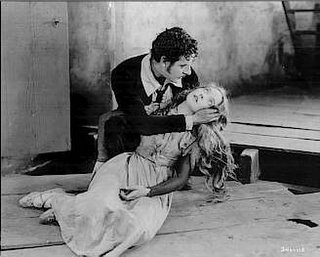
La Boheme (1926)
Director: King Vidor
In 1926, Lillian Gish was one of the most powerful actresses in Hollywood. She had her pick of directors and costars and could choose any project she wanted to do. She chose La Boheme. It's easy to see why Gish would want the talented Vidor to direct and the handsome and charismatic John Gilbert as her leading man. It's also easy to see why if she wanted to move away from her virginal violet roles, as Robert Osborne claimed she did in his introdution to the film for Turner Classic Movies, she chose to portray Mimi. The Mimi of the original novel Scenes de la Vie de Boheme by Henri Murger was a bright and flirtatious coquette. Even Puccini's opera views Mimi as a bit sassy, though it saves its more voluptuous sauciness for the artists' groupie Musetta.
So what are we to make of Gish's Mimi? Frankly, she is a bore. Although Rodolphe and the foppish Vicomte Pa
 ul (Roy D'Arcy) declare her a great beauty (the Vicomte even halts his carriage to try to seduce her when he spots her on the street), Gish was no Greta Garbo. To be a guy magnet, Gish would have had to wipe the perpetual pleading off her face and carry her fragile body with a bit more energy. Instead, she appears to have consumption from the opening scene, and her frolicking at the picnic at which she declares her love for Rodolphe looks more like a child's glee than a would-be bohemian in full abandon. While the Mimi who would have lived in Paris' bohemian Latin Quarter in the 1830s probably would have slept with Rodolphe, Gish's Mimi keeps her chastity well in place. So we have another portrayal of a fragile female innocently in love and Gish no closer to the toughness she was well capable of if we are to judge by her portrayal of a struggling pioneer woman only two years later in The Wind and her shotgun-toting granny in The Night of the Hunter (1955).
ul (Roy D'Arcy) declare her a great beauty (the Vicomte even halts his carriage to try to seduce her when he spots her on the street), Gish was no Greta Garbo. To be a guy magnet, Gish would have had to wipe the perpetual pleading off her face and carry her fragile body with a bit more energy. Instead, she appears to have consumption from the opening scene, and her frolicking at the picnic at which she declares her love for Rodolphe looks more like a child's glee than a would-be bohemian in full abandon. While the Mimi who would have lived in Paris' bohemian Latin Quarter in the 1830s probably would have slept with Rodolphe, Gish's Mimi keeps her chastity well in place. So we have another portrayal of a fragile female innocently in love and Gish no closer to the toughness she was well capable of if we are to judge by her portrayal of a struggling pioneer woman only two years later in The Wind and her shotgun-toting granny in The Night of the Hunter (1955).Her acting choices have a very unfortunate effect on her fellow players. Gilbert was well-known for burning up the screen with Garbo, but here his ardent admiration looks like overacting. When he spots Mimi with the Vicomte, he flies into a jealous rage and beats her. This scene plays like an elephant swatting a fly and makes Gilbert look as horrifying as the brutal father who savagely beats his daughter (Gish) in the tragic Broken Blossoms (1919). The marvelous Renée Adorée does as much as she can with Musetta, but ends up as a mother figure to Gish instead of the loose free spirit she should have been. The other bohemian artists and musicians, played by Gino Corrado, Edward Everett Horton, and George Hassell, are a welcome, but too scarce, source of relief from this soapy melodrama.
Gish was said to have asked MGM to secure the rights to the Puccini opera to play in theatres as the film was shown. This they were unable to do, but I think this request is a fairly key act in determining how Gish saw the film--as grand opera. In this case, I am reminded of my reactions to some famous operas. Forget the ridiculous story and just listen to the music. Unfortunately, with this La Boheme, we don't have Puccini to console us. l


0 Comments:
Post a Comment
<< Home